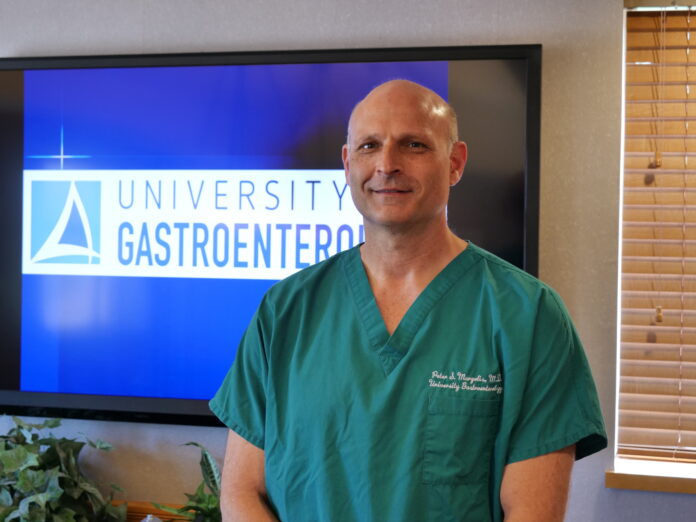Dr. Peter S. Margolis, a gastroenterologist at University Gastroenterology, specializes in colon cancer screening and inflammatory bowel disorder. He discusses patients’ initial reactions to the COVID-19 pandemic and how the practice is rebounding from the health crisis.
PBN: How did the COVID-19 health crisis affect procedures at University Gastroenterology?
MARGOLIS: Like most health care providers, the COVID -19 health crisis continues to negatively affect UGI in many ways. From the standpoint of procedures, the onset of the crisis led to a significant decrease in the number performed mostly due to our need to comply with state and federal guidelines on “elective non-urgent care.” These guidelines were implemented early on in the crisis due to the appropriate concern of supply-chain limitations for the much-needed personal protective equipment for hospital providers as the hospital emergency department and inpatient units became overwhelmed with infected patients.
Another point which is one of the major reasons for our decreased revenue and thus extreme financial stress was UGI’s compliance with the federal and state required guidelines limiting elective non-urgent procedures and health care visits. We set up strict policies to ensure compliance across our organization to support the efforts to preserve the limited supply of PPE, ensure our patients’ and staff’s safety and support the global front-line care efforts to combat the COVID-19 crisis. These sacrifices to help our community deal with the pandemic were the direct drivers of our decrease in productivity, thus leading to severe economic hardship to our health care organization.
PBN: What is the practice doing to make up for weeks or months of canceled appointments?
MARGOLIS: UGI is reaching out to patients and having lengthy conversations on the importance of not delaying their care further. We are trying to triage the long list of patients who were canceled because of the restriction of the COVID-19 pandemic.
We are still very limited in the number of patients we can see under the new distancing and cleaning guidelines, but this is best for the protection of our patients and staff and helping to stop the spread of the disease.
PBN: Can delayed procedures cause potential health impacts for some patients?
MARGOLIS: As the pandemic progressed, many patients were fearful of having procedures or seeking medical care for concern of the risk of exposure and infection. These concerns led to further decreases in the number of office visits and procedures. This delayed care has potentially led to increased hospitalization in those patients who have experienced progression on their symptoms and diseases.
Recognizing this secondary health crisis, state and federal agencies have supported gastroenterology procedures as essential in the first tier of reopening. Unfortunately, many patients remain too concerned to seek health care and continue to postpone needed care.
PBN: How many endoscopic procedures are normally performed at University Gastroenterology?
MARGOLIS: UGI normally performed over 700 procedures per week and provided more than 1,000 consultative visits in the outpatient and hospital settings prior to the COVID-19 crisis. During the crisis, UGI averaged 130 procedures in the outpatient and hospital settings per week, with 50 in-office visits. We eventually provided about 800-900 visits for our patients.
PBN: If the state’s reopening continues according to Gov. Gina M. Raimondo’s current plan, when do you expect the practice to be back to normal?
MARGOLIS: UGI is proceeding with a great deal of precaution for the safety of our patients, staff and providers. As a result, with the greatest respect for the governor’s plan we have implemented social distancing, limited waiting-room occupancy, cleaning exam rooms and bathrooms between patient use, and employing a “no patient visitor” policy. These measures are important to combat the disease and prevent the spread of the virus. Unfortunately, they have significantly limited the number of procedures and office visits we can perform. We are planning a very slow ramp-up out of safely and I do not see UGI getting to full capacity until there is a truly successful mass vaccination program.
Elizabeth Graham is a PBN contributing writer.











